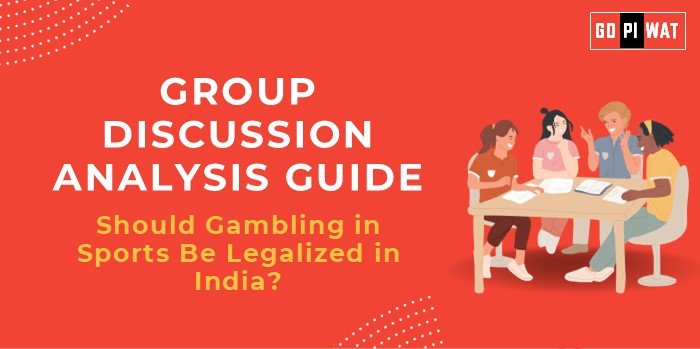📋 Group Discussion (GD) Analysis Guide: Should Gambling in Sports Be Legalized in India?
🌐 Introduction to Gambling in Sports
- Context: Sports gambling is a global multi-billion-dollar industry, with countries like the UK and the US legalizing it under strict regulations. In India, while sports like cricket draw massive viewership, gambling remains largely illegal except in a few states, sparking debate on its legalization.
- Background: India has a complex relationship with gambling laws dating back to the Public Gambling Act of 1867. Recently, the popularity of online sports betting has brought this issue into public discourse, raising questions on regulatory control, economic benefits, and social impact.
📊 Quick Facts and Key Statistics
- 🌍 Global Sports Betting Market: Estimated at over $90 billion annually, with significant growth driven by online platforms.
- 🏏 Illegal Betting in India: Roughly $130 billion wagered annually, with most bets made on cricket.
- 💰 Potential Tax Revenue: Legalized sports gambling could generate an estimated ₹10,000 crores in annual tax revenue.
- 📊 Public Opinion: Surveys indicate that over 55% of Indians favor some form of legalized sports betting, given proper regulations.
- 💼 Employment: Potential for creating over 100,000 jobs in regulatory, tech, and operational sectors.
🧑🤝🧑 Stakeholders and Their Roles
- Government: Legislation, regulation, and tax collection, with a responsibility to mitigate social risks.
- Sports Associations: Ensuring the integrity of sports events and combating match-fixing.
- Betting Companies: Industry operators could drive transparency and revenue under legalized conditions.
- Citizens: Consumers, with interests both in fair play and protection from addiction or financial loss.
- Regulatory Bodies: Establishing a regulatory framework that balances profit with consumer protection.
🏆 Achievements and ⚠️ Challenges
Achievements
- 💰 Economic Opportunity: Legalized sports gambling could significantly increase tax revenue and job creation.
- ✨ Transparency and Regulation: A legal market could help curb match-fixing and promote fair sports practices.
- 🛡️ Consumer Protection: Legalization would allow for consumer safeguards, helping to reduce addiction and financial ruin.
Challenges
- ⚠️ Social Concerns: Gambling addiction and financial instability, especially among vulnerable populations.
- ⚖️ Regulatory Complexity: Implementing nationwide regulations may be difficult, given varied state laws.
- 🎭 Corruption and Match-Fixing: Sports associations fear that legal gambling may still contribute to corruption.
🌍 Global Comparisons
The UK and Australia have legalized sports betting under strict laws that enforce integrity, contributing substantial revenue.
Case Studies: In the US, post-legalization in New Jersey saw tax revenue of $500 million in 2022, underscoring its economic potential.
💬 Structured Arguments for Discussion
- Supporting Stance: “Legalizing sports gambling could significantly boost India’s tax revenue and create a more transparent, regulated industry that mitigates illegal activities.”
- Opposing Stance: “Legalizing gambling may lead to increased addiction and financial instability, posing risks to individuals and society.”
- Balanced Perspective: “While legalization offers economic benefits, robust regulatory frameworks and social safeguards are essential to address potential drawbacks.”
📢 Effective Discussion Approaches
- Opening Approaches:
- 💰 Statistical Impact: “With over ₹10,000 crores in potential tax revenue, legalizing sports gambling could transform India’s revenue landscape.”
- ⚠️ Social Impact Focus: “Legalizing gambling without adequate protections could lead to widespread addiction and societal harm.”
- Counter-Argument Handling: Cite successful international examples with strong consumer protections and emphasize the role of education and limits to curb addiction.
🔍 Strategic Analysis of Strengths and Weaknesses
- Strengths: Economic growth, regulated industry, consumer protection.
- Weaknesses: Risk of addiction, corruption, and financial harm to vulnerable groups.
- Opportunities: Job creation, technological advancements, collaboration with global operators.
- Threats: Legal inconsistencies across states, ethical concerns, black-market persistence.
📚 Connecting with B-School Applications
- Real-World Applications: Potential for legal, regulatory, and economic projects focused on balancing financial growth with ethical considerations.
- Sample Interview Questions:
- “What regulatory measures would you suggest for sports gambling in India?”
- “How might legalized gambling affect India’s sports industry?”
- Insights for B-School Students: Explore frameworks in regulatory finance, social responsibility, and behavioral economics in the context of legalized gambling.


